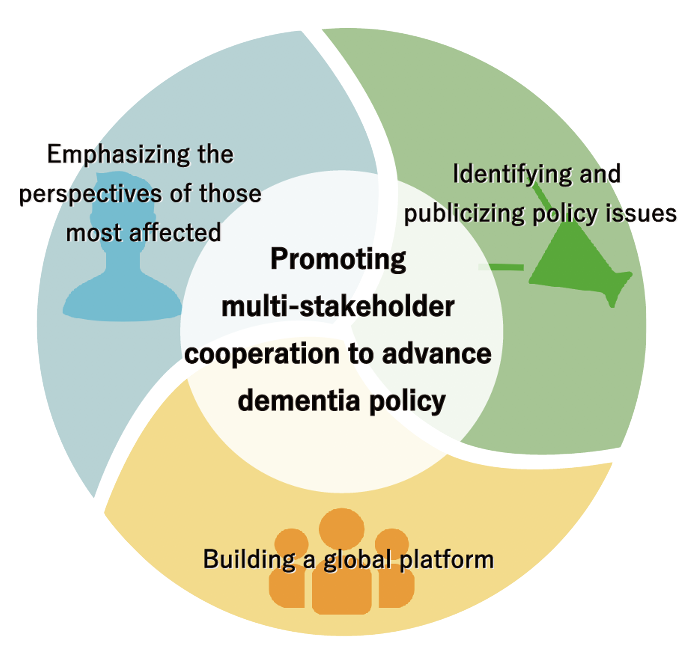 As a non-profit, independent health policy think tank, Health and Global Policy Institute (HGPI) views dementia as a global health policy issue and has been engaged in ongoing efforts to promote dementia policy worldwide. We are deepening our relationships with multi-stakeholders to create a foundation for promoting dementia policy based on three pillars: building a global platform, emphasizing the perspectives of the parties most affected, and identifying and publicizing policy issues.
As a non-profit, independent health policy think tank, Health and Global Policy Institute (HGPI) views dementia as a global health policy issue and has been engaged in ongoing efforts to promote dementia policy worldwide. We are deepening our relationships with multi-stakeholders to create a foundation for promoting dementia policy based on three pillars: building a global platform, emphasizing the perspectives of the parties most affected, and identifying and publicizing policy issues.
Approximately fifteen years have passed since 2004, when the Ministry of Health, Labour and Welfare (MHLW) reviewed its usage of the derogatory term “chiho” to refer to dementia and adopted the term “ninchi-sho” or “cognitive disorder” in its stead. The combined efforts of many parties have helped improve understanding towards dementia significantly and society is now becoming a place where it is natural for people with dementia to speak up about their own experiences and share their opinions. Awareness towards the fact that anyone can develop dementia is growing and members of the public are beginning to understand the need to consider the potential effects of dementia on their own futures. Further cooperation between multi-stakeholders will be key to further accelerate those efforts while ensuring they can advance in an effective and efficient manner. For example, to help overcome the challenges encountered during the development of new pharmaceuticals, we look forward to Government-led efforts that surpass the boundaries between the national and local Governments, industry, and academia that will speed up the development of new pharmaceuticals by creating global Public-Private Partnerships (PPPs), by building data platforms, and by promoting joint clinical studies. Additionally, to promote the development of various products and services that improve quality of life (QOL) for people with dementia or their families, it is also essential to find the ideal framework for valuing products and services from the perspectives of those most affected and to promote involvement from companies with novel ideas outside the boundaries of healthcare.
The scale of multi-stakeholder cooperation we aim to achieve is not limited to large-scale cooperation at the national level. Continuously building links between organizations like municipal governments and local companies at the community level is essential to improve QOL for people with dementia and their families. Existing support systems are centered around healthcare, long-term care, and welfare, but creating links at the community level will expand the scope of those systems so that they encompass civil society, industry, the national Government and local governments, and academia. Such initiatives will help us advance towards dementia policy that encourages deeper cooperation in various frameworks both large and small. HGPI will continue to encourage such developments through proposals and action.
At the same time, we will pursue another one of our central missions, which is to strengthen international networks starting with the World Dementia Council (WDC). Dementia is a global policy issue that cannot be solved through efforts by a single country. We have entered an era in which every stakeholder must participate in international cooperation. Aiming to achieve citizen-driven dementia policy at the global level, HGPI will fulfill its role as a hub that creates opportunities to share and discuss knowledge which will allow stakeholders in various countries to compare and contrast policies and develop innovative new policies together.

 As a non-profit, independent health policy think tank, Health and Global Policy Institute (HGPI) views dementia as a global health policy issue and has been engaged in ongoing efforts to promote dementia policy worldwide. We are deepening our relationships with multi-stakeholders to create a foundation for promoting dementia policy based on three pillars: building a global platform, emphasizing the perspectives of the parties most affected, and identifying and publicizing policy issues.
As a non-profit, independent health policy think tank, Health and Global Policy Institute (HGPI) views dementia as a global health policy issue and has been engaged in ongoing efforts to promote dementia policy worldwide. We are deepening our relationships with multi-stakeholders to create a foundation for promoting dementia policy based on three pillars: building a global platform, emphasizing the perspectives of the parties most affected, and identifying and publicizing policy issues.